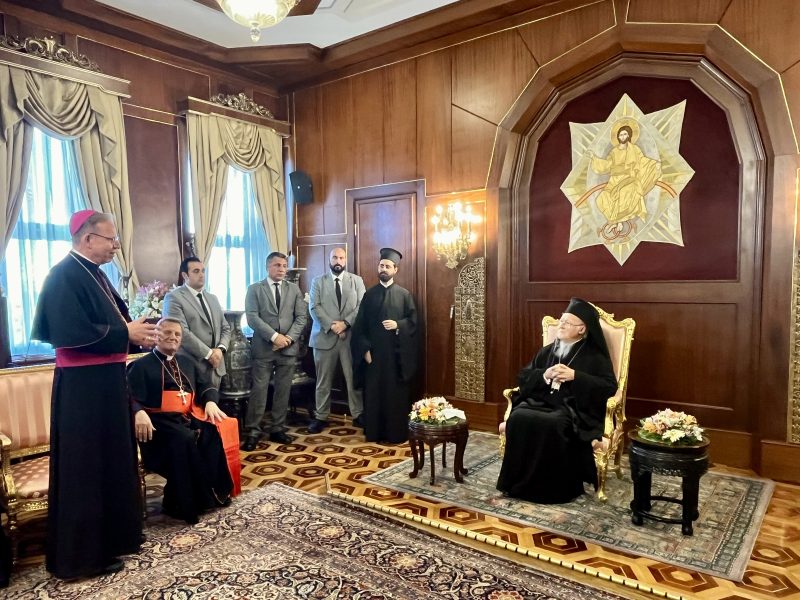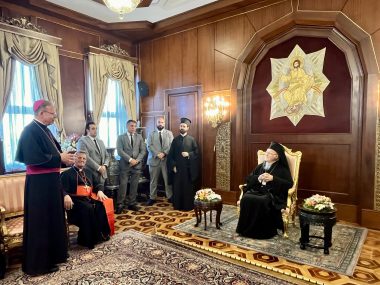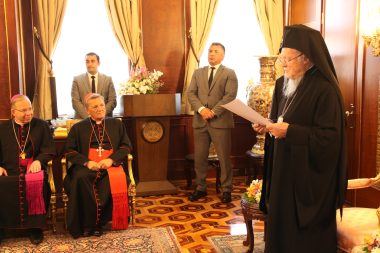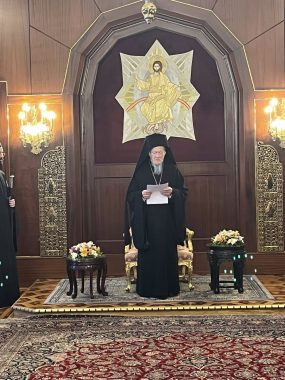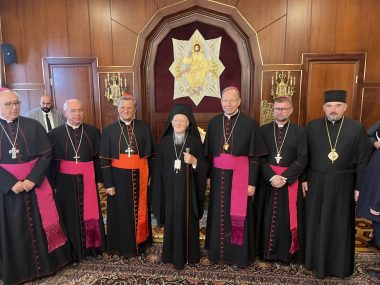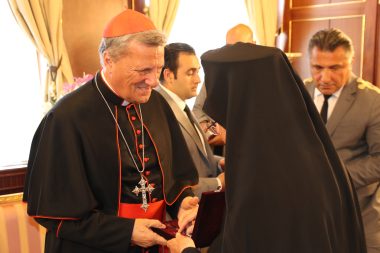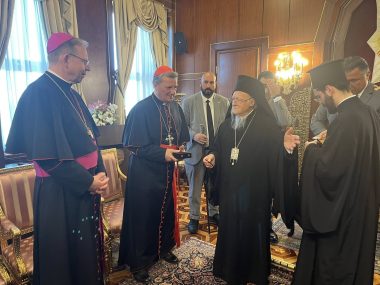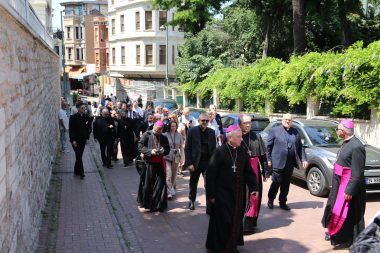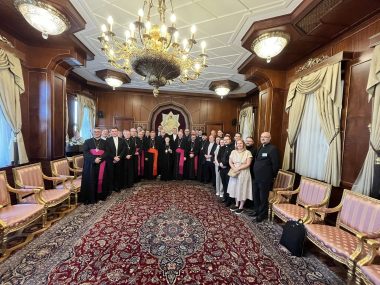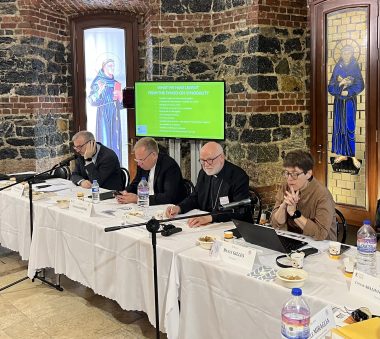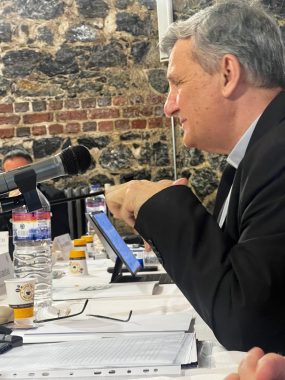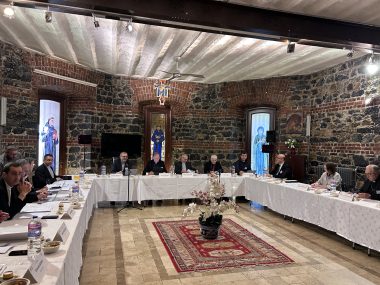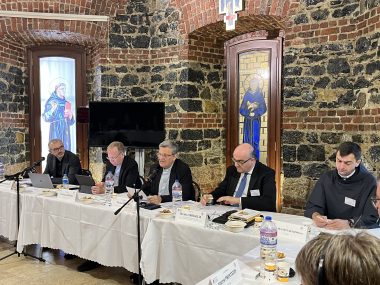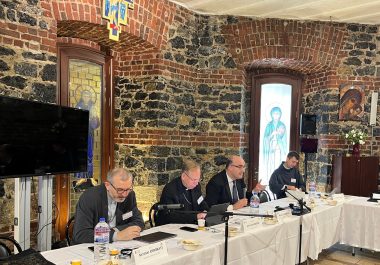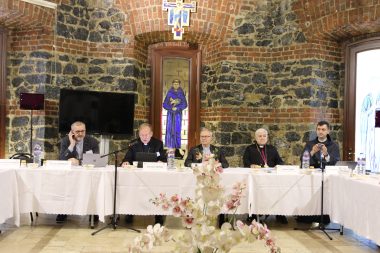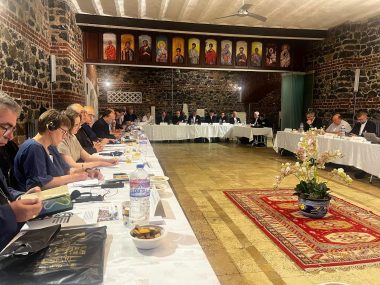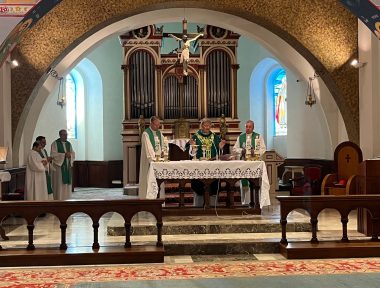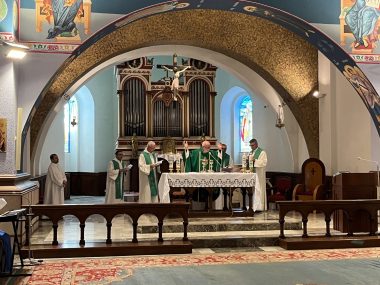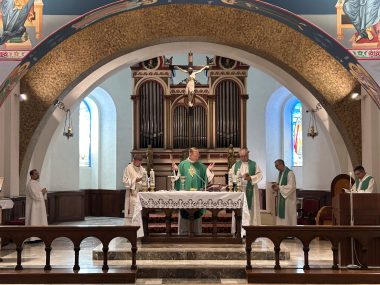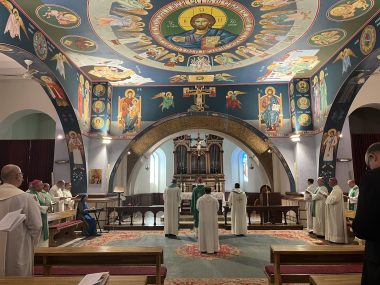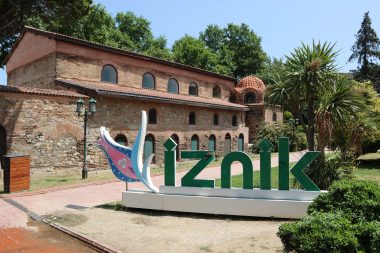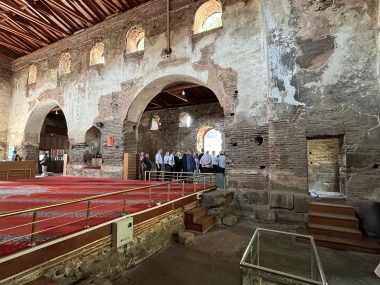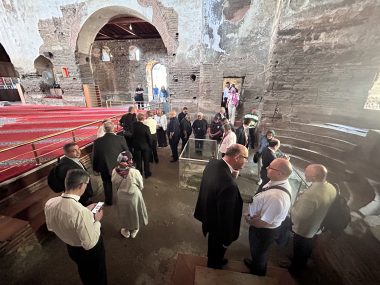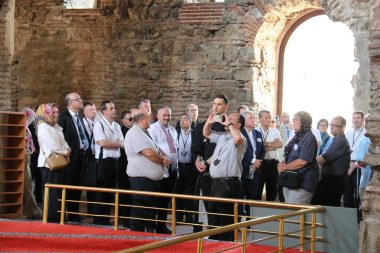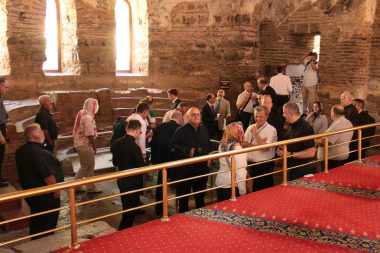From 15 to 18 June 2025, in Istanbul, the general secretaries of the bishops’ conferences of 29 European countries gathered for their annual meeting on the theme “The Reform of the Ecclesiastical Structures in a Missionary and Synodal Perspective”. Special moments of the meeting were also a visit to Nicaea and a meeting with His Holiness the Patriarch Bartholomew I in Fanar.
After official welcome greetings from H.E. Msgr. Marek SOLCZYŃSKI, Apostolic Nuncio to Türkiye and from Msgr. Orhan ÇANLI, Patriarchal Exarch of Syrian Türkiye, H.E. Msgr. Gintaras GRUŠAS, CCEE President, gave the opening greeting on behalf of CCEE, emphasising the kairos which is presented in the choice of place and time of this meeting, being held in the lands where the Church blossomed in its early centuries’ and where exactly 1700 years ago the Council of Nicaea established the Nicene symbol of the Creed, the first Council document to use the expression “We believe”, which resonates strongly for us today in our commitment to rediscover synodality in the Church. Following this, the General Secretary of the Turkish Bishops’ Conference, Fr. Lucian ABALINTOAIEI, OfmConv, presented the history and the current situation of the Church in Türkiye.
The first of three working sessions, opened and moderated by Rev. Antonio AMMIRATI, CCEE General Secretary, was dedicated to the theme “The Reform of the Offices of the Bishops’ Conferences in Light of “Praedicate Evangelium”” and presented by Prof. Michele MIRAGLIA Esq., Jurist and Canonist, Professor at LUMSA University of Rome and at the Claretianum Institute of the Pontifical Lateran University. Starting from the principles and criteria contained in Praedicate Evangelium, Prof. Miraglia highlighted the perspective of the “missionary conversion of the Church” and the role of Bishops’ Conferences, “in which the communio Episcoporum is expressed at the service of the communio Ecclesiarum based on the communio fidelium”. And in distinguishing the “ecclesial discernment” from the individual and communitarian one, and for a Church closer to the needs of its People, Prof. Miraglia proposed a modus procedendi of the offices of the Bishops’ Conferences characterised by “thinking by objectives” rather than “by acts”; an evolution that favours the establishment or strengthening of coordination bodies at all levels within each Conference.
The General Secretaries concluded the first day with a visit to Nicaea, today’s city of Iznìk, where the first ecumenical council was held from 19 June to 25 July 325, where 300 bishops affirmed the divine nature of Christ, opposing the Arian heresy and proclaiming a unified confession of faith, the so-called Nicene Creed. In this place of fundamental importance for Christianity, all recited together the Creed of the whole Church, raising to heaven a single hymn of praise for the gift of faith.
The second working day was dedicated to synodality, and in particular, the “The Accompaniment Process of the Implementation Phase of the Synod”, presented by H. Em. Card. Mario GRECH, General Secretary of the Synod. Cardinal Grech reflected on the synodal process of 2021-2024 in the life and mission of the Church, focusing especially on the new implementation phase, which has just begun and will require the accompaniment of the Bishops’ Conferences. The Secretariat of the Synod is preparing a supporting document for this phase, which will be used until 2028. The new phase of the synodal process offers the opportunity to concretely experience what it means to walk together: “an understanding of which can only be acquired through experience”. This phase of realisation is an ecclesial process that must involve the entire Christian community and for which the bishop is responsible as pastor of the local Church. The experiences gained during the first phase of the synod (consultations, work of synodal groups, etc.) are fundamental tools for revitalising the synodal life of the local Churches and for the realisation phase.
In the afternoon, the participants had a meeting with His Holiness the Patriarch BARTHOLOMEW I at the headquarters of the Ecumenical Patriarchate of Constantinople in Fanar, in a very friendly atmosphere. The meeting was also attended by H. Em. Card. Mario Grech, Secretary General of the Synod. In his address, the Patriarch of Constantinople stressed the importance of the fact that this visit takes place in a particularly significant year: the 1700th anniversary of the First Ecumenical Council of Nicaea. The Council not only gave definitive expression to the Creed of our common faith but also established a vision of conciliarity that continues to shape the life of the Christian Church. His Holiness stated that the First Council of Nicaea reminds us that unity is not a matter of convenience or strategy, but of fidelity to the truth revealed in Christ and proclaimed through the life of the Church. The Patriarch recalled the importance of the relationship between the Ecumenical Patriarchate and the Catholic Church and emphasised the uniqueness of his relationship with the late Pope Francis. He affirmed his joy for the election of Pope Leo XIV: “We are confident that under his leadership the bonds between our two Churches will continue to deepen in truth and love”, adding that he looks forward to the Holy Father’s visit this autumn. Bartholomew I concluded his speech by encouraging the General Secretaries, whose role in the European Bishops’ Conferences is of fundamental importance. “Through your dedicated service, you help ensure that the Church can bear witness and respond to people’s needs. You make possible the consistency, clarity and charity with which the Church speaks today”.
On behalf of the CCEE, Archbishop GRUŠAS greeted Patriarch Bartholomew, assuring him of the utmost importance of relations between the Catholic Church and the Ecumenical Patriarchate of Constantinople. He also informed the Patriarch of the excellent cooperation with the Conference of European Churches (CEC), led by Archbishop Nikitas of Thyateira and Great Britain, and of the joint work on the revised version of the Charta Oecumenica, which the Presidents of the CCEE and CEC were supposed to sign on 27 April in Vilnius, but whose date was postponed due to the death of Pope Francis.
The third – and last – day of the meeting was opened by Dr. Beate GILLES, General Secretary of the German Bishops’ Conference, with a presentation entitled “How to Achieve a more Synodal Church: the Commitment of the Church in Germany”. She provided a brief overview of the Synodal Way in Germany, already ongoing since 2019. Dr Gilles reported on what has been accomplished, learnt and experienced in these years and what is expected for the future. At present, the Church in Germany is focusing on four aspects: synodality in councils at diocesan level, synodality as an aspect of daily work, synodical councils at the level of the Bishops’ Conference, and the evaluation of decisions and work on the synodical path.
The General Secretaries also presented information on current events within their Bishops’ Conferences and listened to reports from the CCEE Commissions, and in particular those of Prof. Ernesto DIACO, Secretary of the Commission for Youth, and Rev. Luis OKULIK, Secretary of the Commission for Social Pastoral Care. The Rev. Manuel BARRIOS PRIETO, General Secretary of COMECE (the institution representing the Bishops’ Conferences to the bodies of the European Union), also reported on the news from COMECE.
The next meeting of the General Secretaries will be held from 14 to 17 June 2026 in Belgrade.

